- Home
- E. F. Benson
Night Terrors Page 4
Night Terrors Read online
Page 4
The pale tired light of earliest morning had turned the window-blinds into glimmering squares before I slept; and when I woke, the servant who called me was already rattling them briskly up on their rollers, and letting the calm serenity of the August day stream into the room. Through the open windows poured in sunlight and sea-wind, the scent of flowers and the song of birds; and each and all were wonderfully reassuring, banishing the hooded forms that had haunted the night, and I thought of the disquietude of the dark hours as a traveller may think of the billows and tempests of the ocean over which he has safely journeyed, unable, now that they belong to the limbo of the past, to recall his qualms and tossings with any vivid uneasiness. Not without a feeling of relief, too, did I dwell on the knowledge that I was definitely not going to visit this equivocal spot. Our drive today, as Harry had said, would not take us within thirty miles of it, and tomorrow I but went to the station and away. Though a thorough-paced seeker after truth might, no doubt, have regretted that the laws of time and space did not permit him to visit Bircham after the sinister dark had fallen, and test whether for him there was visible or audible truth in the tales of the village gossips, I was conscious of no such regret. Bircham and its fables had given me a very bad night, and I was perfectly aware that I did not in the least want to go near it, though yesterday I had quite truthfully said I should like to do so. In this brightness, too, of sun and seawind I felt none of the malaise at my waking moments which a sleepless night usually gives me; I felt particularly well, particularly pleased to be alive, and also, as I have said, particularly content not to be going to Bircham. I was quite satisfied to leave my curiosity unsatisfied.
The motor came round about eleven, and we started at once, Harry and Mrs Morrison, a cousin of his, sitting behind in the big back seat, large enough to hold a comfortable three, and I on the left of the driver, in a sort of trance – I am not ashamed to confess it – of expectancy and delight. For this was in the early days of motors, when there was still the sense of romance and adventure round them. I did not want to drive, any more than Harry wanted to; for driving, so I hold, is too absorbing; it takes the attention in too firm a grip: the mania of the true motorist is not consciously enjoyed. For the passion for motors is a taste – I had almost said a gift – as distinct and as keenly individual as the passion for music or mathematics. Those who use motors most (merely as a means of getting rapidly from one place to another) are often entirely without it, while those whom adverse circumstances (over which they have no control) compel to use them least may have it to a supreme degree. To those who have it, analysis of their passion is perhaps superfluous; to those who have it not, explanation is almost unintelligible. Pace, however, and the control of pace, and above all the sensuous consciousness of pace, is at the root of it; and pleasure in pace is common to most people, whether it be in the form of a galloping horse, or the pace of the skate hissing over smooth ice, or the pace of a free-wheel bicycle humming down-hill, or, more impersonally, the pace of the smashed ball at lawn-tennis, the driven ball at golf, or the low boundary hit at cricket. But the sensuous consciousness of pace, as I have said, is needful: one might experience it seated in front of the engine of an express train, though not in a wadded, shut-windowed carriage, where the wind of movement is not felt. Then add to this rapture of the rush through riven air the knowledge that huge relentless force is controlled by a little lever, and directed by a little wheel on which the hands of the driver seem to lie so negligently. A great untamed devil has there his bridle, and he answers to it, as Harry had said, like a horse with a fine mouth. He has hunger and thirst, too, unslakeable, and greedily he laps of his soup of petrol which turns to fire in his mouth; electricity, the force that rends clouds asunder, and causes towers to totter, is the spoon with which he feeds himself; and as he eats he races onward, and the road opens like torn linen in front of him. Yet how obedient, how amenable is he! – for with a touch on his snaffle his speed is redoubled, or melts into thin air, so that before you know you have touched the rein he has exchanged his swallow-flight for a mere saunter through the lanes. But he ever loves to run; and knowing this, you will bid him lift up his voice and tell those who are in his path that he is coming, so that he will not need the touch that checks. Hoarse and jovial is his voice, hooting to the wayfarer; and if his hooting be not heard he has a great guttural falsetto scream that leaps from octave to octave, and echoes from the hedges that are passing in blurred lines of hanging green. And, as you go, the romantic isolation of divers in deep seas is yours; masked and hooded companions may be near you also, in their driving-dress for this plunge through the swift tides of air; but you, like them, are alone and isolated, conscious only of the ripped riband of road, the two great lantern-eyes of the wonderful monster that look through drooped eyelids by day, but gleam with fire by night, the two ear-laps of splash-boards, and the long lean bonnet in front which is the skull and brain-case of that swift, untiring energy that feeds on fire, and whirls its two tons of weight up hill and down dale, as if some new law as ever-lasting as gravity, and like gravity making it go ever swifter, was its sole control.
For the first hour the essence of these joys, any description of which compared to the real thing is but as a stagnant pond compared to the bright rushing of a mountain stream, was mine. A straight switchback road lay in front of us, and the monster plunged silently down hill, and said below his breath, ‘Ha-ha – ha-ha – ha-ha’, as, without diminution of speed, he breasted the opposing slope. In my control were his great vocal chords (for in those days hooter and syren were on the driver’s left, and lay convenient to the hand of him who occupied the box-seat), and it rejoiced me to let him hoot to a pony-cart, three hundred yards ahead, with a hand on his falsetto scream if his ordinary tones of conversation were unheard or disregarded. Then came a road crossing ours at right angles, and the dear monster seemed to say, ‘Yes, yes, – see how obedient and careful I am. I stroll with my hands in my pockets.’ Then again a puppy from a farmhouse staggered warlike into the road, and the monster said, ‘Poor little chap! get home to your mother, or I’ll talk to you in earnest.’ The poor little chap did not take the hint, so the monster slackened speed and just said ‘Whoof!’ Then it chuckled to itself as the puppy scuttled into the hedge, seriously alarmed; and next moment our self-made wind screeched and whistled round us again.
Napoleon, I believe, said that the power of an army lay in its feet: that is true also of the monster. There was a loud bang, and in thirty seconds we were at a standstill. The monster’s off fore-foot troubled it, and the chauffeur said, ‘Yes, sir – burst.’
So the burst boot was taken off and a new one put on, a boot that had never been on foot before. The foot in question was held up on a jack during this operation, and the new boot laced up with a pump. This took exactly twenty-five minutes. Then the monster got his spoon going again, and said, ‘Let me run: oh, let me run!’ And for fifteen miles on a straight and empty road it ran. I timed the miles, but shall not produce their chronology for the benefit of a forsworn constabulary.
But there were no more dithyrambics that morning. We should have reached Hunstanton in time for lunch. Instead, we waited to repair our fourth puncture at 1.45 p.m., twenty-five miles short of our destination. This fourth puncture was caused by a spicule of flint three-quarters of an inch long – sharp, it is true, but weighing perhaps two pennyweights, while we weighed two tons. It seemed an impertinence. So we lunched at a wayside inn, and during lunch the pundits held a consultation, of which the upshot was this.
We had no more boots for our monster, for his off fore-foot had burst once, and punctured once (thus necessitating two socks and one boot). Similarly, but more so, his off hind-foot had burst twice (thus necessitating two boots and two socks). Now, there was no certain shoemaker’s shop at Hunstanton, as far as we knew, but there was a regular universal store at King’s Lynn, which was about equidistant.
And, so said the chauffeur, there
was something wrong with the monster’s spoon (ignition), and he didn’t rightly know what, and therefore it seemed the prudent part not to go to Hunstanton (lunch, a thing of the preterite, having been the object), but to the well-supplied King’s Lynn. And we all breathed a pious hope that we might get there.
Whizz: hoot: purr! The last boot held, the spoon went busily to the monster’s mouth, and we just flowed into King’s Lynn. The return journey, so I vaguely gathered, would be made by other roads; but personally, intoxicated with air and movement, I neither asked nor desired to know what those roads would be. This one small but rather salient fact is necessary to record here, that as we waited at King’s Lynn, and as we buzzed homewards afterwards, no thought of Bircham entered my head at all. The subsequent hallucination, if hallucination it was, was not, as far as I know, self-suggested. That we had gone out of our way for the sake of the garage, I knew, and that was all. Harry also told me that he did not know where our road would take us.
The rest that follows is the baldest possible narrative of what actually occurred. But it seems to me, a humble student of the occult, to be curious.
While we waited we had tea in an hotel looking on to a big empty square of houses, and after tea we waited a very long time for our monster to pick us up. Then the telephone from the garage inquired for ‘the gentleman on the motor’, and since Harry had strolled out to get a local evening paper with news of the last Test Match, I applied ear and mouth to that elusive instrument. What I heard was not encouraging: the ignition had gone very wrong indeed, and ‘perhaps’ in an hour we should be able to start. It was then about half-past six, and we were just seventy-eight miles from Dunwich.
Harry came back soon after this, and I told him what the message from the garage had been. What he said was this: ‘Then we shan’t get back till long after dinner. We might just as well have camped out to see your ghost.’
As I have already said, no notion of Bircham was in my mind, and I mention this as evidence that, even if it had been, Harry’s remark would have implied that we were not going through Bircham.
The hour lengthened itself into an hour and a half. Then the monster, quite well again, came hooting round the corner, and we got in.
‘Whack her up, Jack,’ said Harry to the chauffeur. ‘The roads will be empty. You had better light up at once.’
The monster, with its eyes agleam, was whacked up, and never in my life have I been carried so cautiously and yet so swiftly. Jack never took a risk or the possibility of a risk, but when the road was clear and open he let the monster run just as fast as it was able. Its eyes made day of the road fifty yards ahead, and the romance of night was fairyland round us. Hares started from the roadside, and raced in front of us for a hundred yards, then just wheeled in time to avoid the ear-flaps of the great triumphant brute that carried us. Moths flitted across, struck sometimes by the lenses of its eyes, and the miles peeled over our shoulders. When it occurred we were going top-speed. And this was It – quite unsensational, but to us quite inexplicable unless my midnight imaginings happened to be true.
As I have said, I was in command of the hooter and of the syren. We were flying along on a straight down-grade, as fast as ever we could go, for the engines were working, though the decline was considerable. Then quite suddenly I saw in front of us a thick cloud of dust, and knew instinctively and on the instant, without thought or reasoning, what that must mean. Evidently something going very fast (or else so large a cloud could not have been raised) was in front of us, and going in the same direction as ourselves. Had it been something on the road coming to meet us, we should of course have seen the vehicle first and run into the dust-cloud afterwards. Had it, again, been something of low speed – a horse and dog-cart, for instance – no such dust could have been raised. But, as it was, I knew at once that there was a motor travelling swiftly just ahead of us, also that it was not going as fast as we were, or we should have run into its dust much more gradually. But we went into it as into a suddenly lowered curtain.
Then I shouted to Jack. ‘Slow down, and put on the brake,’ I shrieked. ‘There’s something just ahead of us.’
As I spoke I wrought a wild concerto on the hooter, and with my right hand groped for the syren, but did not find it. Simultaneously I heard a wild, frightened shriek, just as if I had sounded the syren myself. Jack had felt for it too, and our hands fingered each other. Then we entered the dust-cloud.
We slowed down with extraordinary rapidity, and still peering ahead we went dead-slow through it. I had not put on my goggles after leaving King’s Lynn, and the dust stung and smarted in my eyes. It was not, therefore, a belt of fog, but real road-dust. And at the moment we crept through it I felt Harry’s hands on my shoulder.
‘There’s something just ahead,’ he said. ‘Look! don’t you see the tail light?’
As a matter of fact, I did not; and, still going very slow, we came out of that dust-cloud. The broad empty road stretched in front of us; a hedge was on each side, and there was no turning either to right or left. Only, on the right, was a lodge, and gates which were closed. The lodge had no lights in any window.
Then we came to a standstill; the air was dead-calm, not a leaf in the hedgerow trees was moving, not a grain of dust was lifted from the road. But behind, the dust-cloud still hung in the air, and stopped dead-short at the closed lodge-gates. We had moved very slowly for the last hundred yards: it was difficult to suppose that it was of our making. Then Jack spoke, with a curious crack in his voice.
‘It must have been a motor, sir,’ he said. ‘But where is it?’
I had no reply to this, and from behind another voice, Harry’s voice, spoke. For the moment I did not recognise it, for it was strained and faltering.
‘Did you open the syren?’ he asked. ‘It didn’t sound like our syren. It sounded like, like – ’
‘I didn’t open the syren,’ said I. Then we went on again. Soon we came to scattered lights in houses by the wayside.
‘What’s this place?’ I asked Jack.
‘Bircham, sir,’ said he.
Gavon’s Eve
It is only the largest kind of ordnance map that records the existence of the village of Gavon, in the shire of Sutherland, and it is perhaps surprising that any map on whatever scale should mark so small and huddled a group of huts, set on a bare, bleak headland between moor and sea, and, so one would have thought, of no import at all to any who did not happen to live there. But the river Gavon, on the right bank of which stand this half-dozen of chimneyless and wind-swept habitations, is a geographical fact of far greater interest to outsiders, for the salmon there are heavy fish, the mouth of the river is clear of nets, and all the way up to Gavon Loch, some six miles inland, the coffee-coloured water lies in pool after deep pool, which verge, if the river is in order and the angler moderately sanguine, on a fishing probability amounting almost to a certainty. In any case, during the first fortnight of September last I had no blank day on those delectable waters, and up till the 15th of that month there was no day on which someone at the lodge in which I was stopping did not land a fish out of the famous Picts’ pool. But after the 15th that pool was not fished again. The reason why is here set forward.
The river at this point, after some hundred yards of rapid, makes a sudden turn round a rocky angle, and plunges madly into the pool itself. Very deep water lies at the head of it, but deeper still further down on the east side, where a portion of the stream flicks back again in a swift dark backwater towards the top of the pool again. It is fishable only from the western bank, for to the east, above this backwater, a great wall of black and basaltic rock, heaved up no doubt by some fault in strata, rises sheer from the river to the height of some sixty feet. It is in fact nearly precipitous on both sides, heavily serrated at the top, and of so curious a thinness, that at about the middle of it where a fissure breaks its topmost edge, and some twenty feet from the
top, there exists a long hole, a sort of lancet window, one would say, right through the rock, so that a slit of daylight can be seen through it. Since, therefore, no one would care to cast his line standing perched on that razor-edged eminence, the pool must needs be fished from the western bank. A decent fly, however, will cover it all.
It is on the western bank that there stand the remains of that which gave its title to the pool, namely, the ruins of a Pict castle, built out of rough and scarcely hewn masonry, unmortared but on a certain large and impressive scale, and in a very well-preserved condition considering its extreme antiquity. It is circular in shape and measures some twenty yards of diameter in its internal span. A staircase of large blocks with a rise of at least a foot leads up to the main gate, and opposite this on the side towards the river is another smaller postern through which down a rather hazardously steep slope a scrambling path, where progress demands both caution and activity, conducts to the head of the pool which lies immediately beneath it. A gate-chamber still roofed over exists in the solid wall: inside there are foundation indications of three rooms, and in the centre of all a very deep hole, probably a well. Finally, just outside the postern leading to the river is a small artificially levelled platform, some twenty feet across, as if made to support some super-incumbent edifice. Certain stone slabs and blocks are dispersed over it.

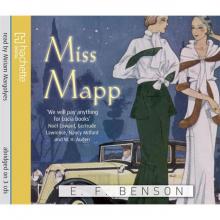 Miss Mapp
Miss Mapp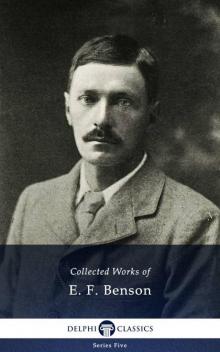 Works of E F Benson
Works of E F Benson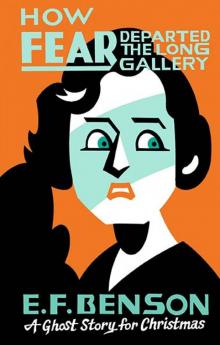 How Fear Departed the Long Gallery
How Fear Departed the Long Gallery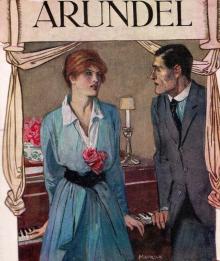 Dodo's Daughter: A Sequel to Dodo
Dodo's Daughter: A Sequel to Dodo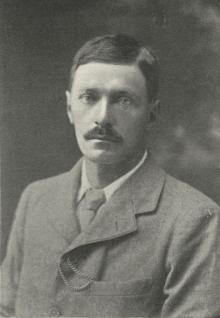 The House of Defence v. 1
The House of Defence v. 1 Queen Lucia
Queen Lucia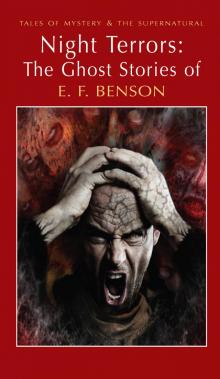 Night Terrors
Night Terrors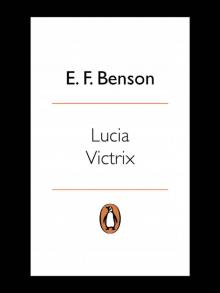 Lucia Victrix
Lucia Victrix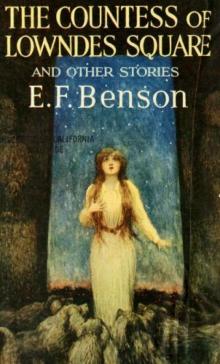 The Countess of Lowndes Square and Other Stories
The Countess of Lowndes Square and Other Stories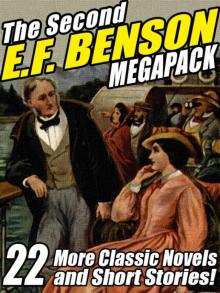 The Second E. F. Benson Megapack
The Second E. F. Benson Megapack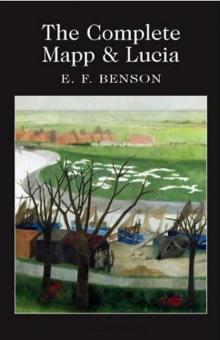 The Complete Mapp & Lucia
The Complete Mapp & Lucia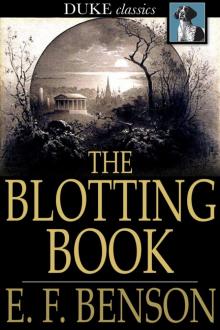 The Blotting Book
The Blotting Book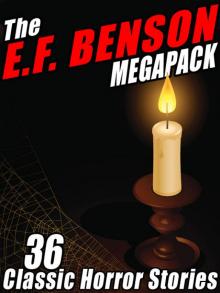 The E. F. Benson Megapack
The E. F. Benson Megapack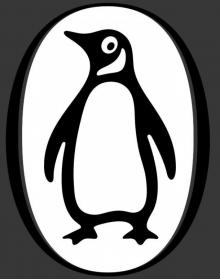 Lucia Rising
Lucia Rising Ghost Stories
Ghost Stories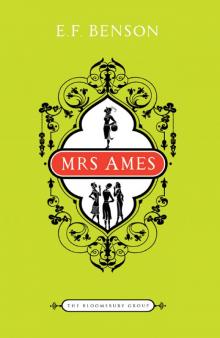 Mrs. Ames
Mrs. Ames E. F. Benson
E. F. Benson